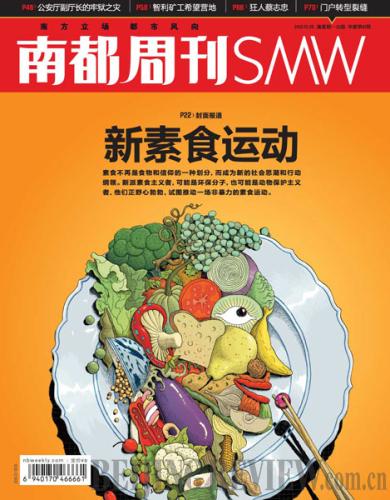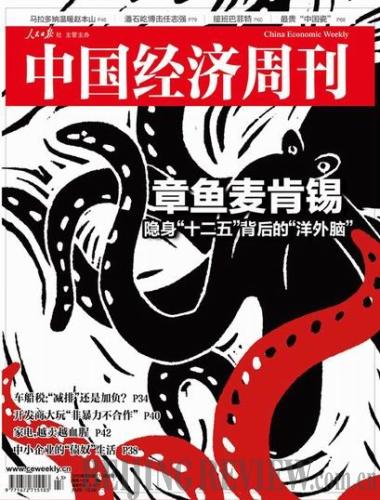|  Southern Metropolis Weekly Southern Metropolis Weekly
China's New Vegetarianism
October 25, 2010
As vegetarianism flourishes worldwide, more and more Chinese are adopting the practice, particularly young intellectuals, office workers and university students. Unlike traditional vegetarians who say no to meat because of religious considerations, these well-educated new vegetarians care more about animal rights, health and global warming. They hope to raise public awareness about their lifestyle.
Though vegetarians make up only a minority in China, they are confident that vegetarianism will become popular. "As a minority culture in China, vegetarianism currently is not capable of [overtaking] eating meat. However, if we vegetarians stick to our beliefs, we will finally change people's lifestyles in an imperceptible way," said Jiang Jinsong, a vegetarian professor from Tsinghua University.
Jiang also said as long as it is connected to the criticism of inhumane activities, vegetarianism will have a good future.

China Economic Weekly
Foreign Think Tanks in China
November 8, 2010
Given its rapid urbanization and industrialization, China urgently needs more intellectual support behind its development strategies. In Western countries traditionally, think tanks have provided this support, but China lacks such institutions. International think tanks like McKinsey are beginning to work with local governments and state-owned enterprises on economic development issues.
But in reality, local governments only reference blueprints provided by foreign think tanks, according to Wen Zhigang, an official from a local government's Development and Reform Commission.
Compared with their foreign counterparts, Chinese consulting institutions have their deficiencies. This doesn't mean that foreign think tanks are doing a better job in China. Their vision sometimes can't be applied to the country's reality, and they are often unfamiliar with local economies and how government departments run.
However, their presence has a positive effect. By virtue of their reputations, their programs help local governments to bring in investment.

Oriental Outlook
Creative Differences
November 4, 2010
For East China Normal University's School of Design, which was responsible for the design of the Urban Footprints Pavilion at the Shanghai Expo, the Expo was a chance to show off. The school's participation also brought to light problems endemic in China's creative industries.
Neither the industries' producers nor consumers are mature. Creative enterprises set a high price for their aesthetic products, but Chinese consumers view products' basic functions as more important. Few are willing to pay for a design concept and artistic taste.
However, the government has been directing and subsidizing the design industry to improve its image and acceptance by the public.
|